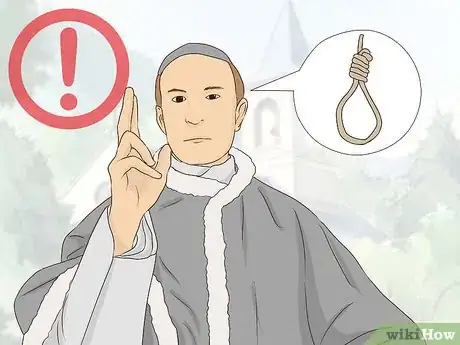This article was co-authored by Natalie Feinblatt, PsyD. Dr. Natalie Feinblatt is a Clinical Psychologist with a private practice based in Los Angeles, California. With over 15 years of experience, Dr. Feinblatt specializes in helping people with addiction, trauma, and other mental health struggles. She holds a BA in Psychology from The University of California, San Diego, and a Master’s degree and Doctor of Psychology (PsyD) from Pepperdine University. Dr. Feinblatt is licensed in the state of California.
There are 10 references cited in this article, which can be found at the bottom of the page.
This article has been viewed 103,081 times.
Religious cults are groups of people who adhere to a strict belief system and organize around a charismatic leader. Unlike a church, a religious cult is destructive and uses fear and manipulation to command their membership. If you evaluate their doctrine, examine their practices, and take your time to look at the church objectively, you can determine whether an organization is a legitimate church or a cult.
Steps
Evaluating the Doctrine
-
1Read the church's rules. Cults thrive on the unquestioning obedience of their membership.[1] Often, a cult's rules will be arbitrary and many of them will benefit the leader or leadership of the cult. Also, there are often harsh punishments for breaking the rules including excommunication or mandatory physical labor like Scientology.[2]
- Many times the cult's rules are pointless and exist only to ensure the allegiance of the members.
- Common cult rules include having to be subservient to the leadership, being barred from talking to anyone outside of the cult, and requirements to drastically change your lifestyle.
- Be particularly aware of "prosperity theology",[3] which essentially states that financial blessings and physical well-being are part of God's plan for the church's followers, and often encourages tithing to the church. It has been criticized as exploitative of the poor, and several churches which teach prosperity gospels have been mired in financial fraud cases.
-
2Determine what would happen if you left the church. Cults will often have severe punishments in place for those who decide to leave the church. Common consequences could include a punishment directly from God or being prevented from talking to family and friends within the church.[4]Advertisement
-
3Beware of denunciation sessions. Denunciation sessions are displays of public humiliation, where the leader of the church will humiliate you in front of other members. If the church mandates group activities like this, it's a sign it could be a cult.[5] [6]
- This type of activity is often designed to train you not to fight back, to ignore your intuition, and to turn you into a stoic and placid individual.[7]
-
4Avoid churches that obsess over prophecy or that talk of mass suicide. Many cults will obsess over a fabricated prophecy that doesn't align with churches in the same religion or talk about mass suicide. If the church preaches about scary unavoidable prophecies or suicide, it is probably a cult.[8]
- Usually, these prophecies will come from a human leader of the church and are not based on religious text.
-
5Evaluate whether the church requires you to isolate yourself. Cults use isolation so that they can manipulate you and prevent you from figuring out that the organization is a cult. Avoid churches who require mandatory isolation or a cutting of ties with family and friends.
- Typically cults will draw you in at first and you'll find out about the mandatory isolation later.
-
6Determine if they have an elitist doctrine. Many cults will have an elitist doctrine that sees themselves as superior to those outside of the cult. Cults will often convince members that they are an elite group of people who were born to save the world or change the course of human history. If you notice an elitist or arrogant personality from the members, it could be a cult.[9]
- This could also manifest in intolerance for others outside of the cult.
Examining Behavior
-
1Avoid churches that give special benefits to higher members. Many cults have a group of leaders who receive special benefits or that don't have to abide by the same rules as other members of the cult. If you notice a strict hierarchy that receives special benefits and are exempt from the rules, it could be a cult.[10]
- Cults usually have a group of leaders whose main goal is to gain wealth, power, and influence.
-
2Recognize the typical traits of a cult leader. Watch the leader of the church and examine their behavior. Determine if they are really trying to spread their religion or are out for personal gain. Avoid churches who have arrogant, pompous, or angry leaders.[11]
- If the leader of the church is hyper sensitive, requires constant admiration, humiliates people in public, has a grandiose sense of self, or requires sexuals acts from the church's membership, there's a very high likelihood that this person is a cult leader.
- Various leaders of different cults often have very similar personality traits.
- Be wary of leaders who have absolute power and who are exorbitantly wealthy.[12]
-
3Avoid churches that employ mind control techniques. Things like hypnosis, group peer pressure, and mandatory isolation are common mind control techniques that religious cults use to control their members. Try to identify times that the church has made these things mandatory and avoid any church that employs these tactics.
- Common hypnosis techniques include repetitive music and patterned paced speaking that can put people into a trance.
-
4Question the rules. If you ask questions about the group's rules and the church's leaders become defensive or angry, it may be a sign that you're in a cult. A true church will be transparent about their doctrine.[13] If they want undying loyalty, it's a good sign that it may be a cult.[14]
- Real churches will have explanations for their rules or can point to some form of scripture or text that explains the rules.
-
5Determine if the church uses intimidation and manipulation. A cult will often use threats and fears to keep their membership in line. This could come in the form of a calamity sent by God or the threat of isolation from family and friends. If the church uses intimidation and fear to get their members to follow the rules, it's a sign that the church is a cult.[15]
-
6Beware of churches who require you to perform unwanted favors. If the church members or leadership consistently pressure you to do favors for them that are outside of the scope of the church, it's a sign that the church is a cult. These favors can cut into your time and could include things like picking things up from the store, physical labor, or financial contributions.
Deciding if the Church is a Cult
-
1Read common criticism of the church. Seek out common criticisms of the church by searching news about the church online. Read opinions and experiences from past and current members of the church. It may enlighten you to know how other people view the church and may give you the details that you need to know if it's a cult. If a church is a legitimate church, it will be able to hold up to criticism.[16]
- If a church prevents you from reading critical literature, it's a sign that the church is a cult.
-
2Talk to family and friends outside of the church. Ask friends and family that aren't members of the church if they think that the church is a cult. Their opinions will be more unbiased than members of the church, and they may be able to give you a better objective view. If the church prevents you from talking or interacting with other people outside of the church, it's a sign that the church is a cult.
- You can say something like, “Hey, do you think this new church I'm going to is strange? I've been thinking that it might be a cult. What do you think?”
-
3Be honest with yourself. Think about the church's goals and how it treats its members. If you find something disturbing, wrong, or morally corrupt, it's a good sign that the church may be a cult. Churches exist to benefit the many, and if you don't feel like the church is doing that, it may be a cult.
- It may be harder to recognize if your church is a cult if you're currently a member of the church.
Community Q&A
-
QuestionI have a red flag. My adult daughter has taken her new church family as her only family. Her biological family is no longer part of her life. Doesn't sound right, does it?
 Community AnswerNo, removing followers from their outside relationships is classic cult behavior.
Community AnswerNo, removing followers from their outside relationships is classic cult behavior. -
QuestionA church which members consist of family and few friends. Established in 1970 and has not grown in members. 50 members max.
 Community AnswerYou can't be certain just based on the size of the church. Think of other factors, like whether the membership is exclusive and if you're allowed to speak to other people outside of the church. Do a search online to see if you can find any negative testimonials from ex-members of the church.
Community AnswerYou can't be certain just based on the size of the church. Think of other factors, like whether the membership is exclusive and if you're allowed to speak to other people outside of the church. Do a search online to see if you can find any negative testimonials from ex-members of the church. -
QuestionIf a church wants you to convert people, is that a sign of a cult?
 Community AnswerNot necessarily, many religions instruct members to spread the word of God and recruit new members to the church. It can be a sign of a cult, though, so keep an eye out for other suspicious practices.
Community AnswerNot necessarily, many religions instruct members to spread the word of God and recruit new members to the church. It can be a sign of a cult, though, so keep an eye out for other suspicious practices.
References
- ↑ Natalie Feinblatt, PsyD. Clinical Psychologist. Expert Interview. 30 July 2021.
- ↑ http://cultresearch.org/help/characteristics-associated-with-cults/
- ↑ https://en.wikipedia.org/wiki/Prosperity_theology
- ↑ http://www.cbsnews.com/news/how-to-identify-a-cult-six-expert-tips/
- ↑ Natalie Feinblatt, PsyD. Clinical Psychologist. Expert Interview. 30 July 2021.
- ↑ http://cultresearch.org/help/characteristics-associated-with-cults/
- ↑ Natalie Feinblatt, PsyD. Clinical Psychologist. Expert Interview. 30 July 2021.
- ↑ https://www.today.com/video/jonestown-mass-suicide-revisiting-the-cult-that-ended-with-the-deaths-of-900-913556547629
- ↑ http://www.decision-making-confidence.com/cult-tactics.html
- ↑ http://www.cbn.com/spirituallife/cbnteachingsheets/pat_perspective_cult.aspx?mobile=false
- ↑ https://www.psychologytoday.com/blog/spycatcher/201208/dangerous-cult-leaders
- ↑ Natalie Feinblatt, PsyD. Clinical Psychologist. Expert Interview. 30 July 2021.
- ↑ Natalie Feinblatt, PsyD. Clinical Psychologist. Expert Interview. 30 July 2021.
- ↑ https://www.culteducation.com/faq.html
- ↑ http://www.decision-making-confidence.com/cult-tactics.html
- ↑ https://www.youtube.com/watch?v=gsjD2dre6QI&feature=youtu.be&t=1m31s











































































